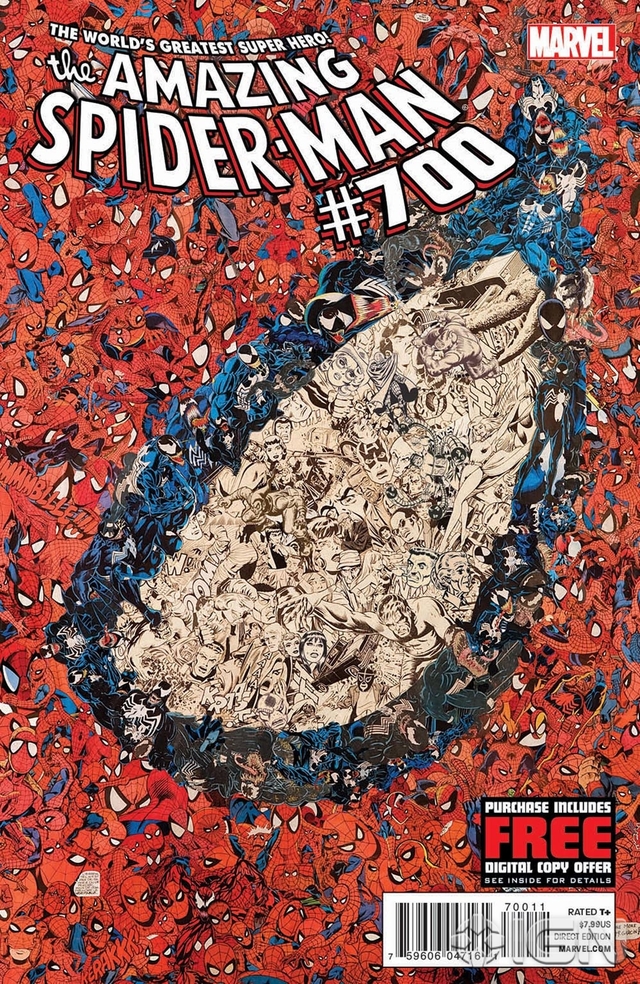If you follow comics, you’re likely aware something happened in Spider-Man #700. This post discusses that something. Don’t want it spoiled? Don’t click the jump. The rest of you, let’s discuss.
I really liked Spider-Man #700 until the ending, when Peter Parker dies inside the decaying body of Doctor Octopus. The book telegraphs the death throughout – as it should have if the death was to have meaning – by giving the reader a glimpse at Peter’s past and all he’s sacrificed. We’re also given classic Parker ingenuity and typical Spider-humor in Peter’s escape from prison. It’s a great read until the ending. It’s not a problem that Peter Parker died. It’s the way he died that’s the problem.
While there’s plenty of groundwork laid in this issue, and those prior, for what this final battle means to its two participants, the possibility that some of Peter Parker’s soul and memories could be triggered inside Doc Ock is never mentioned until it becomes necessary. All Peter has to do is spend a couple minutes thinking of several times when people he loves have died and that reverses years of hate and ego in Doc’s mind. Could this have been enough to result in an ending where Doc feels remorse for what he’s done, decides the world needs Peter as Spider-Man and reclaims his own body and dies? Sure. Is it enough to give him a sense of responsibility for his newfound power? No.
Redeeming Otto would have given Peter’s death meaning but it’s clear that hasn’t happened. Just minutes after he’s supposedly learned Peter’s strength as a hero lies in his sense of sacrifice, Otto decides he can be a “superior” Spider-Man because of his “genius…and ambition.” It’s as if he decides to be a hero because it will bring him fame and fortune. Not exactly a Parkerian view.
Otto is a threat because in his heart he wants one thing: power and worship. Take that away from him and he’s not an interesting character. A Spider-Man who does heroic things because he wants power and worship is certainly an interesting take, but it also means Peter’s death was in vain and Otto got exactly what he wanted.
Nobody reads Spider-Man because Peter Parker’s great at being Spider-Man. They read it because more often than not, Peter fails. He gets up off the mat each time, but he’s vulnerable. A superior Spider-Man isn’t an idea that has much resonance. It’s unsustainable. And, not for nothing, as my friend Alan pointed out to me the other day, there’s too much invested in Peter Parker in the Spider-Man movies for there not to be a Peter Parker in the Spider-Man movies.
Let’s remind ourselves that deaths in comics are often impermanent. Peter’s death in the comics will obviously be temporary. But the deaths have consequences and impact when they happen, particularly for the hero’s friends and family. Therefore the death has an impact for the reader. Even Superman’s brief death had consequences the DC Universe dealt with for years.
While part of the conflict of a Doc Ock-as-Spider-man title will inevitably involve how Ock hides his true identity from Peter’s friends and family, it won’t feel like a Peter Parker-less universe to them. The drama of his death is lacking because none of them know he’s gone. If there’s none of that drama in the story, there’s none of it for the reader. Only anger and sadness for characters who aren’t allowed to grieve.
Nothing about Peter Parker’s death seems real or consequential. I wish I felt more anger over such shoddy treatment of the character, but everything in #700 seemed to say “Don’t worry, this won’t last long” and it’s hard to get worked up over something that barely feels as if it happened.

